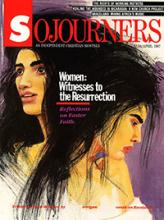Mary Magdalene, Joanna, Mary the mother of James, Salome, and other women experienced the first Easter message, "He is risen!" Their journey to the tomb to perform a final act of love is rewarded with the great news of the Resurrection of Jesus: "So they left the tomb in a hurry, afraid and yet filled with joy, and ran to tell his disciples" (Matthew 28:8).
The words "afraid and yet filled with joy" from the Matthean account of the Easter witness are readily applicable to my own faith experience of resurrection. I am certain that these women who went to share the message with the other disciples knew that their words would be received as "nonsense." ("Women's talk"; "You know how women are!") Yet the subsequent appearances of a resurrected Christ could only calm their fears and increase their joy.
These women had experienced Jesus in their daily lives as open to them, conversing with them in defiance of the cultural relationships between men and women, caring for them. His acts of healing and love, his parables of just relationships, his promises of presence and power through the Holy Spirit, his benediction of peace, his obedience to the will of God's purposes unto death - all these shaped their faith and kept them significantly active in the formation of the early Christian church and in the interpretation of its mission.
Through the centuries women of faith have experienced the combination of fear and joy as they have seen the Resurrection as applicable to their own claim to newness of life. In the midst of performing daily acts of love, women, believing in a living Christ, have moved beyond the limitations of life as defined by cultural, societal, and legal modes.
Read the Full Article

